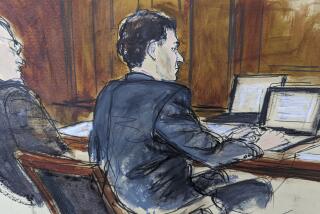Jurors Are Told of Deception at Enron Unit
- Share via
HOUSTON — Executives at Enron Corp.’s money-losing water subsidiary ordered auditors to avoid recording a loss by basing the unit’s worth on a nonexistent “growth strategy,” a former Enron accountant testified Monday.
John R. Sult, a former partner at Enron auditor Arthur Andersen, testified at the federal fraud trial of former Enron Chairman Kenneth L. Lay, 63, and Chief Executive Jeffrey K. Skilling, 52, that he was unable to discover any growth strategy. He submitted his calculations to another Andersen partner to take to a meeting with Lay in October 2001, Sult said, without directly linking Lay to the deception.
“Everything they gave us assumed the existence of the growth strategy,” Sult testified. “I continued to look for further evidence of the existence of a growth strategy.” Sult said he found “nothing at all.”
Lay is accused of falsely claiming to auditors that Enron had a growth strategy for its Azurix water unit and of failing to disclose the effects of disastrous investments in overseas water and wastewater markets. Azurix abandoned a growth strategy in 1999. Enron was forced to buy the company’s shares back from the public in March 2001.
Lay and Skilling face at least 25 years in prison if convicted on charges that they conspired to defraud Enron investors and enrich themselves.
Another Andersen auditor, Thomas Bauer, testified that he was shocked when shown a handwritten list of off-the-books transactions maintained by Enron’s former chief financial officer, Andrew S. Fastow. Those deals helped Enron keep debt and losses off the books until the company filed for bankruptcy filing in December 2001.
“I was shocked when I saw this,” said Bauer, who audited Enron’s energy trading unit and said he didn’t see the list, known as Global Galactic, until 2004. Any one of the transactions on the document “would have caused concern over the integrity of management,” he said.
Andersen, once one of the world’s five biggest accounting firms, was convicted of evidence tampering in 2002 for shredding Enron-related documents while a federal investigation was underway.
That conviction was overturned last year, although the firm had gone out of business.
Skilling’s and Lay’s defense teams claim that prosecutors are seeking to criminalize normal business practices and that they are victims of thieving subordinates such as Fastow, the chief government witness.
Enron had more than $68 billion in market value before it sought bankruptcy protection in December 2001, wiping out thousands of jobs and at least $1 billion in retirement funds almost overnight.
Bauer testified that Enron management represented to Andersen every quarter that all material information, including any oral or supplemental agreements, had been supplied to auditors.
“You can’t audit what you can’t see,” he said.
Bauer is scheduled to continue his testimony today. He is to be followed by Standard & Poor’s credit analyst Ron Barone and former Enron Treasurer Ben Glisan Jr., who is serving a five-year prison term for conspiracy.
Prosecutor Kathryn Ruemmler said Glisan would be released from prison on furlough during his testimony. FBI agents will transport him to and from his home to the courthouse until his testimony wraps up, and then he will be taken back to prison, she said.
More to Read
Inside the business of entertainment
The Wide Shot brings you news, analysis and insights on everything from streaming wars to production — and what it all means for the future.
You may occasionally receive promotional content from the Los Angeles Times.









